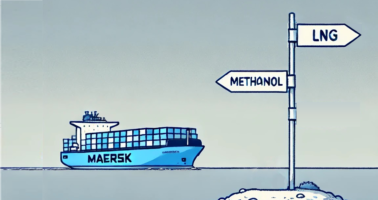In a landmark move, Maersk has announced the signing of contracts for the construction and chartering of new vessels that will be able to operate on Liquefied Natural Gas (LNG). This move marks a significant shift in the company’s strategy, which until now had rejected the use of LNG in favour of more sustainable fuels such as green methanol.
August 7, 2024

Maersk, one of the world's leaders in maritime transport, has announced the Signing of contracts for the construction and chartering of between 50 and 60 new dual-fuel vessels. These ships, with a total capacity of approximately 800,000 TEU, will be equipped to operate with both conventional fuels and Liquefied Natural Gas (LNG). This ambitious order is part of a fleet renewal program aimed at maintaining the company's competitiveness while advancing towards its decarbonization objectives.
The decision to incorporate LNG into Maersk's fleet comes in a context of uncertainty in the supply of cleaner alternative fuels, such as green methanol. The recent cancellation of Ørsted's FlagshipONE project, a key initiative for the production of e-methanol in Sweden, has highlighted the current challenges in the scalability and availability of this sustainable fuel. Against this backdrop, Maersk has opted for a more pragmatic strategy that allows it to continue reducing its emissions while developing more sustainable solutions in the long term..
Vincent Clerc, Maersk's new CEO, explained that the order for these vessels has been placed in bulk due to the long lead times at shipyards, thus ensuring a balanced distribution of deliveries in the coming years. This strategic decision also reflects the need to adapt quickly to stricter environmental regulations and to customers' increasing expectations regarding sustainability.
Despite this shift, Maersk has reaffirmed its commitment to fully decarbonizing its operations by 2050. The company maintains that the adoption of LNG is a transitional solution, while it continues to invest in the development and deployment of zero-emission fuels such as green methanol and other renewable alternatives.
Previous Maersk strategy
For several years, Maersk has been a strong advocate of methanol as a key fuel in its decarbonisation strategy. Under the leadership of previous CEO Søren Skou, the company explicitly rejected the use of LNG, arguing that, as a fossil fuel, it did not align with the company’s long-term sustainability goals. Skou emphasised the need to “jump” directly to zero-emission fuels, positioning green methanol as the most promising option.
This commitment materialised in significant orders for vessels capable of operating on methanol. Maersk invested in the construction of 25 dual-fuel vessels designed to use green methanol, with 5 already in service and 20 more in different stages of construction. These investments demonstrated the company's determined commitment to leading the transition towards cleaner fuels in the maritime industry.
Maersk’s methanol strategy also included collaborations with energy producers and infrastructure projects to ensure a stable and sustainable supply of this fuel. The company sought to create a robust supply chain that would support the large-scale adoption of green methanol in the maritime sector.
However, recent challenges in the development and production of green methanol, exemplified by the FlagshipONE project cancellation - also announced this month - have highlighted the difficulties of rapidly scaling up this fuel to meet the needs of the industry. These obstacles have led Maersk to re-evaluate its strategy and consider transitional alternatives that will allow it to advance towards its decarbonisation objectives without compromising operational efficiency.
Market implications
Maersk’s decision to incorporate LNG into its fleet represents a significant strategic shift that has implications beyond the company itself. This move reflects an adaptive response to the current realities of the energy market and could influence the decisions of other players in the maritime industry.
The shift in Maersk’s strategy coincides with the transition of leadership from Søren Skou to Vincent Clerc as CEO of the company. While Skou maintained a firm stance against LNG, advocating immediate zero-emission solutions, Clerc has taken a more pragmatic approach, recognizing the need for intermediate solutions that allow the company to maintain its commitment to decarbonization while developing and scaling sustainable fuels.
This strategic adjustment can be interpreted as a necessary adaptation to the practical and economic challenges facing the industry in its transition towards sustainability. By opting for an open strategy, which includes both LNG and methanol, Maersk demonstrates flexibility and willingness to use all available tools in reducing its carbon footprint.
The adoption of LNG, despite criticism for being a fossil fuel, offers an immediate reduction in emissions compared to traditional marine fuels and can serve as a technological platform for future transitions to even cleaner fuels, such as bio-LNG or even hydrogen.
However, the move has generated mixed reactions in the industry and among environmental groups. While some see the decision as a practical step toward reducing emissions, others criticize it for potentially delaying the adoption of truly sustainable solutions and investing in infrastructure that could become obsolete as cleaner alternatives are developed.
Maersk’s influence in the maritime sector is considerable, and its strategic decisions often serve as a benchmark for other companies. This shift could therefore trigger similar re-evaluations of fuel strategies across the industry, balancing sustainability aspirations with current operational and economic realities.

